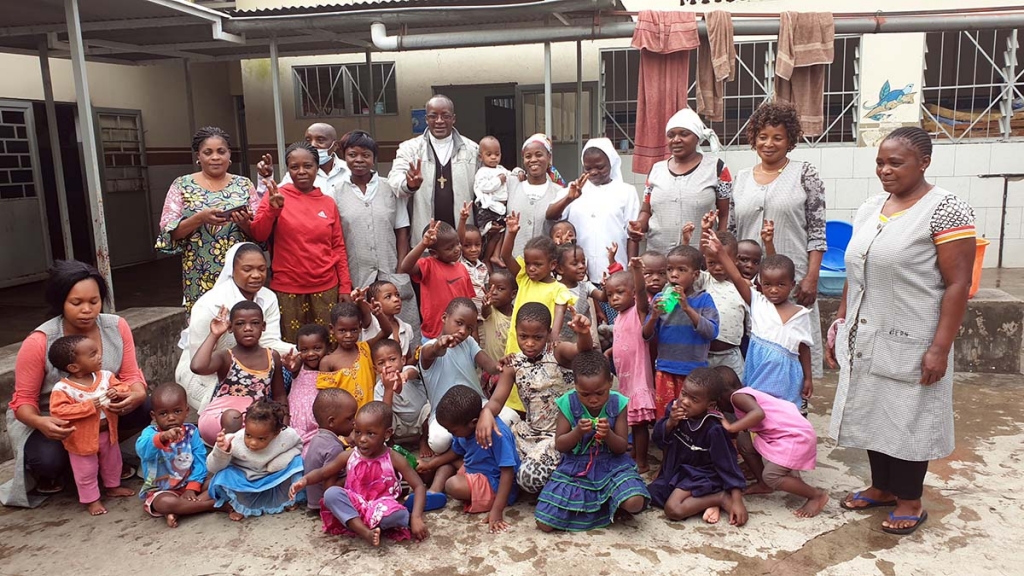DR CONGO: Abandoned children receive care

Salesian centers care for homeless and abandoned children in Bukavu and Goma
(MissionNewswire) Father Albert Kabuge, Salesian provincial of the Central Africa Province, recently visited Salesian programs in Bukavu and Goma and made an appeal for support for 75 abandoned children and babies living at the Ushindi Center Orphanage. These children are accessing shelter, care and basic needs, and when old enough, they will be enrolled in Salesian education.
The Democratic Republic of the Congo was plagued by intense civil war and ongoing internal conflict. As a result, there have been close to 5.4 million deaths, according to the International Rescue Committee. Most deaths resulted from non-violent causes such as malaria, diarrhea, pneumonia and malnutrition, all typically preventable under normal circumstances but often fatal in times of conflict. Close to 1.5 million people have been internally displaced or have become refugees in neighboring countries after having fled the country to escape the continued violence.
Children have been left abandoned or with mothers who can no longer afford to care for them. Salesian centers help to provide support and education, and in cases where children are without parents or abandoned, they provide shelter and raise children until they are self-sufficient and can be on their own.
In addition to the Ushindi Center Orphanage, Salesians also operate the Don Bosco Center Ngangi in Goma, which has been providing social development, medical and educational services to poor youth and their families since 1988.
Started first as a youth center, the Don Bosco Center expanded to provide assistance to those in the region affected by war, other violence and natural disasters. In 1997, the center added kindergarten, elementary, secondary and vocational education as well as a literacy center and medical facility.
In 2009, the Don Bosco Center Ngangi was awarded the International Award, Los Niños Primero (Children First) from the Spanish Committee of UNICEF, in recognition of its outstanding work on behalf of children and poor youth in the region of northern Kivu. In the midst of wars, violence and poverty, the Don Bosco Center welcomed, educated, cared for and supported more than 26,000 children.
“Don Bosco Center Ngangi is one of the most diverse and comprehensive Salesian organizations in the Democratic Republic of the Congo,” said Father Gus Baek, director of Salesian Missions, the U.S. development arm of the Salesians of Don Bosco. “Built on the grounds of a school and sports field, the center has grown to provide vocational training, refugee housing, rehabilitation for child soldiers, and programs for those needing nutritional and medical care. Programs in Goma and Bukavu struggle to meet a growing need, often with very limited resource.”
Despite its vast material wealth, the Democratic Republic of the Congo has long been a very poor nation. Half of the country’s population lives below the poverty line, living on less than $1 a day, especially those in rural communities. More than 7.5 million people do not have enough food to eat.
Salesian missionaries have been working in the Democratic Republic of the Congo for more than 100 years ensuring that the most vulnerable children are not forgotten. Salesian primary and secondary schools and programs lay the foundation for early learning while Salesian trade, vocational and agricultural programs offer many youth the opportunity for a stable and productive future.
###
Sources:
ANS Photo (usage permissions and guidelines must be requested from ANS)
ANS – DR Congo – AFC Provincial launches appeal for solidarity for 75 abandoned children
Salesian Missions – Democratic Republic of the Congo
UNICEF – DR Congo
*Any goods, services, or funds provided by Salesian Missions to programs located in this country were administered in compliance with applicable laws and regulations, including sanctions administered by the U.S. Department of Treasury’s Office of Foreign Asset Control.





